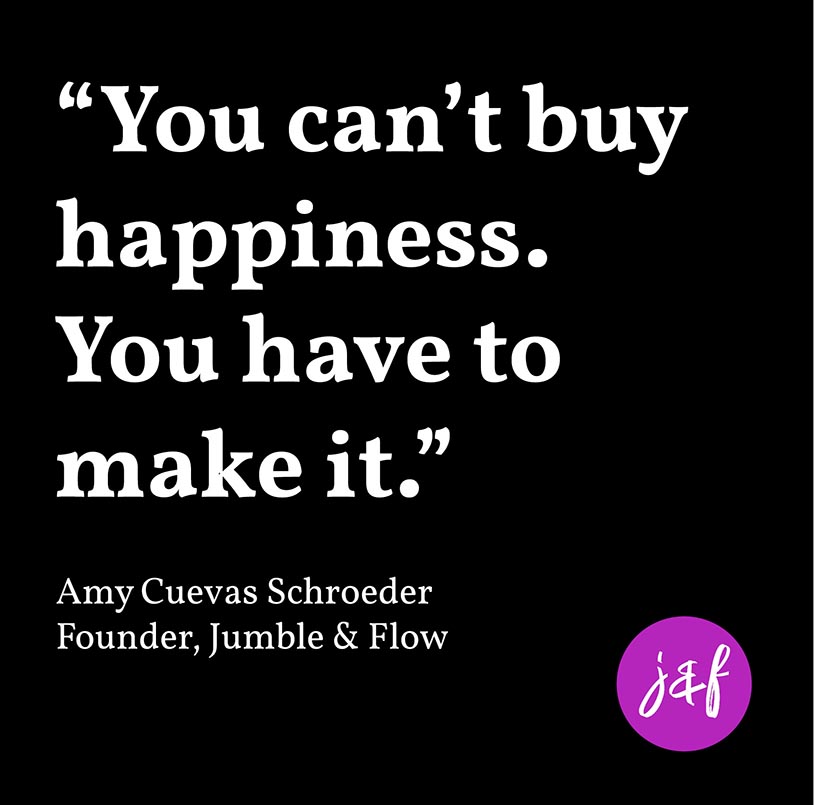
Stuck in a rut? 8 ways to get your groove back
For some people, losing their groove is abundantly clear — to the point where friends say, “What happened to the old you? I miss that person.” For others, losing their groove is subtle; you can’t quite put your finger on where the groove went or when it stopped playing music in the first place.
Whether no one else notices your groove is gone or it’s just you who feels off — like your zest took a sabbatical, or as though life just isn’t flowing the way you’d like — you can get your groove back. You can also establish a totally new groove and maintain it moving forward. The first step is realizing that you lost your groove to begin with.
Where’d my groove go?
There have been times in my life when I’ve thrived. Like the stretch in my mid-twenties when I worked full time while building my own publishing company “on the side,” and co-organizing a weeklong music event for thousands of people in Chicago. All that while dating and having a blast in general. On the flip side, there have also been times when I lost my groove — like that time in my early 30s when I lost the company I founded.
More recently, in my early 40s (before the pandemic), I slowly fell into a slump while working remotely for an ecommerce company that strongly disliked remote workers. There were only a handful of remote employees out of several hundred. It was the kind of place where the CEO announced in mass emails that “remote workers are not allowed to be promoted.” The kind of place — like a well-known travel gear company — that seemed progressive on the surface but behind the scenes belittled and publicly shamed employees.
Why did I stay at this company for four years, with each passing year adding more stress, hours, and responsibility, sans promotion? It’s a complicated story involving my pregnancy with twins, my special needs child, and needing to live near my parents for childcare help. That and after a rough ride as a young entrepreneur, I craved the stability and health insurance that comes with a full-time “regular job” — and my husband and children depended on me.
Over time, I gave into this company’s toxic culture. No one stood up for me when the CEO put me down — at one point, my direct boss said, “it’s definitely a handicap that you have to be a remote worker but there’s nothing we can do,” so I just figured it was my problem. I gulped down my black sheep status and worked diligently in a haze of guilt, watching as younger single people came on board and stepped into roles above mine. The longer I stayed at Toxic Company, the more instances I’d see of other people either putting up with public demonization or fleeing with their tail between their legs.
Now that I’ve left Toxic Company and have reinstated my groove after more than a year of recovery, I realize that sometimes you have to forget who you are in order to reignite your happiness and remember the old you — the real you — deep down inside.
Which is not to say that I’m not prone to letting my busy routine get the best of me. I’m often guilty of mistaking productivity for happiness and staying on the treadmill of life for fear of falling off. But we all have to step back sometimes and ask ourselves if the treadmill we’re on makes us happy.
Why does happiness matter?
The Guardian points out that one popular misconception about happiness is that happy people are somehow more likely to be lazy or ineffective. “In fact research shows the opposite is true: happiness doesn’t just feel good, it actually leads to a wide range of benefits for our performance, health, relationships and more.”
So, rather than success being the key to happiness, research shows that happiness could in fact be the key to success.
Whether your groove got away from you or you want to keep your happiness well-oiled, these eight tips will help. You probably already know most of this advice — it’s just easily forgotten.

1. Remember that you’re in charge of your happiness
“Happiness is not a goal; it is a by-product.” — Eleanor Roosevelt
I’m placing this advice at the top because we all need happiness reminders. It’s so true that our relationships with people are the most important thing for our happiness. In fact, research shows that people with strong relationships are happier, healthier, and live longer. But we can’t rely solely on other people to make us happy. I learned this the hard way — don’t we all — when I was in a relationship with the wrong person.
On the career front, there have been more times than I’d like to admit that I got caught in the trap of thinking that trying to make a toxic person happy would make me happier. Or I’d think, “Maybe if I just grind harder, smile more, and make other people look good, I’ll be happier.” Wrong.
We are all in charge of our own happiness. Other people — lovers, bosses, coworkers, friends — cannot make you happy. Your job is to make yourself happy.
2. Get your mental health in order
I’m not suggesting that everyone is mentally ill, but I do believe that everyone’s got their something. Meaning, just about everyone — whether they realize it or not — faces some sort of personal challenge at some point. It’s not uncommon for even the healthiest of minds to experience bouts of depression, anxiety, an unhealthy obsession, debilitating fear, etc.
Johns Hopkins states that an estimated 26% of Americans ages 18 and older — about one in four adults — suffers from a diagnosable mental disorder in a given year. Especially right now during the pandemic, it’s all too easy to fall into a bad groove or a routine that sucks the joy right out of you.
For me, I had two mental blockers. The first was neglected management of Bipolar II, and the second was a built-up resentment toward my husband that I didn’t want to admit. As for the Bipolar II, I’d initially been diagnosed in my early 20s but didn’t stay on meds and wrote it off in my 30s. I was OK most of the time, so I managed, and when I did see therapists in my mid to late 30s, one dozed off during a session (not kidding) and another suggested that maybe I just had bad PMS. Thankfully, a few years ago, I found a therapist who referred me to a top-notch psychiatrist who properly diagnosed me and I’m now on medication that keeps me level.
On the marriage front, I didn’t want to admit that I had years of built-up resentment for all that I’d been through to support our family. I know my husband is a big-hearted, generous person who takes amazing care of me and my kids — that’s why I didn’t want to face the fact that I resented him. He was the bigger person who suggested we go to therapy to work through our issues. It took a few months, but I’m now free of the burdens that come with repressing resentment.
I know all too well that it’s easier to procrastinate than it is to find help for whatever your something is. But please take the first step toward finding help. That might be searching for recommended therapists in your area or asking a friend if they’ve experienced a similar challenge.
I now realize that I have to invest in my mental health every day — it’s a regimen that I’m committed to. In addition to stress management, ample sleep, and medication, these other “mental health hacks” work well for me: vitamin D, exercise, using a solar lamp in the winter, and transcendental meditation.
3. Let go of whatever’s sucking your soul
If someone — a coworker, romantic partner, family member, or “friend” — has stolen your soul, I’m giving you permission to do something about it. Fear of confrontation aside, you need to confront whatever toxic situation is in your life right now.
If it’s your job that’s sucked the life out of you, I’m not necessarily saying you should quit your job tomorrow. Get your ducks in a row first. The first step is admitting that someone or something has sucked your soul. The next step is doing something about it. Write in your journal about your soul-sucker, talk about it with someone you trust. Take the next step.
4. Let yourself be vulnerable in a safe setting
I’ve always been an open person, but I’ve never been quite as open in the workplace until I presented my “life in thirds” while working for an amazing remote-first SAAS company in late 2019.
Have you heard of “life in thirds”? Me neither until the company organized an offsite for all employees to meet in San Diego, and invited me and two others to present our life stories onstage. This was the kind of company that had an amazing Diversity, Equity, and Inclusion team and encouraged honesty, openness, and vulnerability. It was the exact opposite of Toxic Company, where sharing details about your life story would be a professional death sentence.
Here’s how it works: Mentally divide your life into thirds — for example, if you’re 30, your first third will be what happened during your life from age 1–10; second third, age 11–20, and final third will be age 21–30. When you tell your personal story, talk about one or two things that shaped you during each third of your life.
During the company offsite, I nervously walked onstage, and presented my life in thirds for close to 15 minutes. I let it hang out. OK, not all the way out, but that was the first time I’d shared my story with more than 100 colleagues in a very real way — flaws and all — and it felt really good. I talked about my hearing loss after suffering an extreme fever at age 3. I talked about having moved like nine times by the time I reached eighth grade, and how both those experiences made me shy as a kid, but also observant — a skill that I lean on all the time now.

In my second chapter, I talked about how I started my first business in my dorm room, sold the business in my early 30s, and had a falling out with the new owners of the company. And in my latest chapter, I talked about how I’ve reinvented myself, met the love of my life and got married after knowing one another for only three months. I also talked about how we did IVF and got pregnant with twins and how one of our daughters was diagnosed with a rare syndrome called Pitt Hopkins. I think that’s the part when some people teared up. And I think that’s the point I’m trying to get to here. I’ve largely gotten my groove back by being vulnerable, standing up and saying, “This is my life — parts of it I’ve designed. Parts of it I haven’t. And I’m proud to be where I’m at.”
In the end, the nerves were worth it. My coworkers approached me afterward and said they connected with my story. Everyone really does have their something, and I’m loud and proud about it now.
5. Listen to your instincts
Have you ever been offered an opportunity to make an exciting life choice that seems awesome on the surface but your body is screaming “Red alert! Attention self: This is anything but awesome!”? Listen to that feeling. That may be your instincts’ way of forcing you to slow down and think things through.
My instincts reared their head in fall 2020 shortly after I accepted a new job for a tech startup that paid a lot more than what I was previously earning. At first, my boss seemed like an innocent workaholic. And she probably was. The problem was that — without my knowing — her boss was putting extreme pressure on her, which trickled down to me. My boss quickly became a toxic micromanager.
Without going into detail, I became extremely stressed and grumpy in my personal life and had trouble sleeping. I didn’t like the person I’d become and quit on the spot during a meeting with my boss after only one month. Though I started with intentions of staying with the company a long time and didn’t want to end on a bad note, my instincts told me that this job was a dead-end. I was confident that I’d find something healthier one way or another. Three weeks after leaving the company, I heard from a former colleague there that my boss was fired. Two months after leaving the company, I found out that the entire company closed for good. If I hadn’t trusted my instincts, I’d likely be extremely miserable and unemployed right now.
Important note: I don’t mean to imply that all feelings of worry or hesitation are Code Red alerts like the one I experienced. But I do think it’s important to slow down and listen to your instincts when they’re trying to tell you something.
6. Clean out the cobwebs
At this point in my life — raising two kids, working full time, while building a business on the side — I’ll probably won’t have the luxury to do a complete Marie Kondo anytime soon. But! As a lover of Marie Kondo and all the minimalist mindset stuff, I make time for quick clean-outs—mentally and domestically—on the regular. I’ll clean out a drawer before bedtime, sort the mail almost daily, and I keep a “Donate Me Now” box in our garage. I feel rejuvenated every time the box fills up and I donate the contents to charity.
7. Learn something new
For far too many people, myself included, especially when you reach a certain age or a certain level in your career, you might feel like you know all that you need to know. You’ve got your degree(s), you’ve moved up the ladder, you’re good to go. But as you’ve probably heard many times before, an anti-learning mindset is like a downward career spiral.
I’m currently making a conscious effort to face my fears in order to learn new software and seek out knowledge and expertise from more experienced folks. I recently found a mentor at my new job and am soaking up as much wisdom as I can.
8. Remember how far you’ve come
“Even a happy life cannot be without a measure of darkness, and the word ‘happy’ would lose its meaning if it were not balanced by sadness. It is far better to take things as they come along with patience and equanimity.”
— Carl Jung
Every night before I go to bed, I think about what I’m grateful for. I’ve lost my groove a few times, but now that I’ve got it back, I’m determined to keep it well-oiled.
Sorry, the comment form is closed at this time.


Melissa
Really great article, Amy! Thank you for sharing it all.